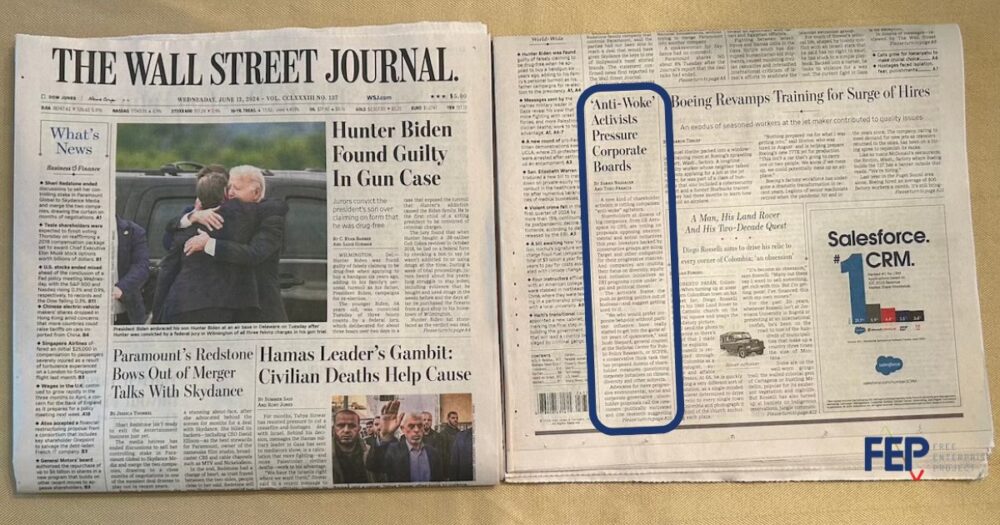
01 Jul 2024 FEP Hits Front Pages, Stands Out in Fight Against SEC Power Grab
Our ears have been burning in recent weeks as front-page spreads raise the chatter about the National Center for Public Policy Research’s Free Enterprise Project (FEP) and show just how effectively it has led the fight against the ESG juggernaut.
As you know, while ESG stands for “environmental, social and governance,” what it means is corporations breaking the law and their duties to shareholders by running their businesses (often directly into the ground) according to leftwing policy goals rather than to maximize value for shareholders. There are many kinds of ESG evil, with the two most prominent being bringing company-wide racism, sexism and orientation discrimination back to companies (DEI), and trading affordable, reliable energy and products for expensive, unreliable and often technologically impossible “green” energy.
As FEP has argued since before anyone knew the term “ESG,” this is pure, partisan leftwing politics, and is definitely not “doing well by doing good.” For a long time we felt like lonely sentries shouting from the ramparts about an invading army no one else could see. Now, though, everyone can see it and even in some very unlikely places honest brokers appear to have recognized that we’ve been right all along.
That, anyway, is what we take from FEP’s having been featured on the front pages of two national newspapers, the Wall Street Journal and the Washington Post. While the Journal (the news pages of which look themselves to have a bit of a wokeness problem) snarked a bit about FEP being “agitators,” each story treated the positions FEP has long taken with respect and the recognition that FEP and its ideas are winning and (however reluctantly) that they are probably correct. The most negative critique they could achieve, again in the Journal, was that FEP’s and its allies’ proposals don’t score high shareholder-vote totals — failing to report, as we explained to them, that those low totals don’t demonstrate shareholder disinterest in corporate neutrality, but instead are a measure of the dishonesty, fiduciary breach and potential regulatory and even criminal liability of the big three investment houses (BlackRock, State Street and Vanguard) and the two major proxy advisory services (ISS and Glass Lewis).
So we still have some work to do.
Then, just last week, another compliment to FEP rolled in: an article in the Harvard Corporate Law Forum. The authors specially identified the brief submitted by FEP and its fine lawyers at the New Civil Liberties Alliance (the folks who just defeated Chevron — the modern equivalent of the Battle of Saratoga, if you ask us), recognizing the series of sound grounds that we raise in our brief to shut down the SEC’s ridiculous “climate-change” overreach and put the Commission back in its place. This is the fourth lawsuit we’ve brought in the last 2 years against SEC overreach (three of them with NCLA), and it looks like we and they make quite a team, and are getting some recognition for it.
All of these are some pretty fine Independence Day presents, and FEP is glad to have them to put by the grill as we celebrate the noble and glorious Fourth. And as to the Journal’s snark, especially on the verge of the celebration of 1776, we remind that fine paper that the croakers called the Architect of Independency himself an “agitator” for his long and often lonely fight to hatch the egg of the new land of liberty, the United States. On this of all weeks, we’re delighted to stand with Mr. Adams, and hope he’ll have us at his side.
Featured photo by bruce mars on Unsplash.




